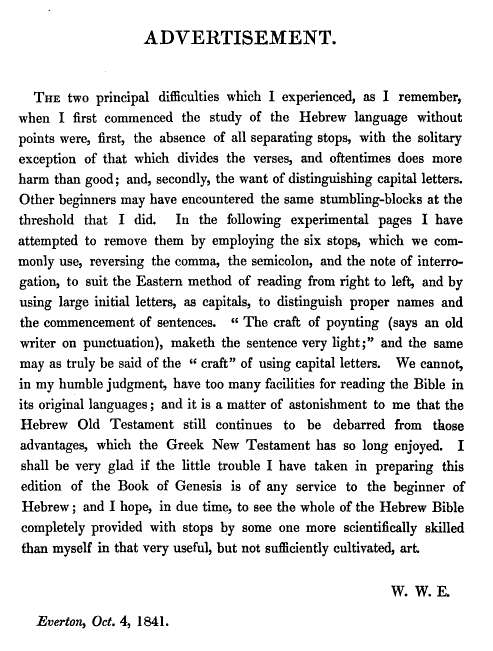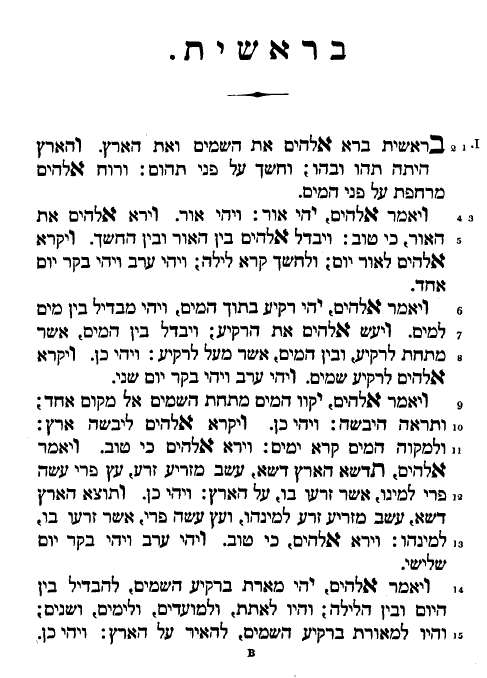So it is that many Christians and others, desiring to learn to read Hebrew, consistently complained about the difficulty occasioned by the nekkudot, or points. This occasioned periodic suggestions that the points aren't really necessary, or at least tapped into the existing theological and historical controversies about them.
In 1841 a British minister named William Withers Ewbank identified a further problem and came up with an original solution - his edition of Genesis, called "בראשית · The Book of Genesis, in the original Hebrew without points, but with Stops and Large Initial Letters (edited as an experiment)." That is to say, he felt that the lack of normal (=European) punctuation, as well as the lack of capital letters to indicate proper nouns, made Hebrew more difficult. So his version includes both features. Not only that, he took care to do something which - to my dismay - modern Hebrew never chose to do to this very day: his commas point to the right!


Take a look at the question marks in the story of Cain and Abel:






When you mentioned Q marks and the Cain and Abel story, I thought you were going to reference 4:13 to see which of the classical explanations he preferred.
ReplyDeleteNever heard of this Ewbanks, but his descendant did a great job on the Newleywed game.
DF
Arabic uses question marks oriented in that direction. Sometimes i use them in Hebrew.
ReplyDeleteAt other times, when making notes in gemaras, I use a Latin question mark for interrogative questions and an Arabic one for rhetorical ones.
Arabic question marks are also good for Hebrew on the computer, because they have built in right-to-left direction orientation -- unlike standard Latin "?"s which are by default left-to-right and can show up funky sometimes when combined with right-to-left Hebrew.
ReplyDeletevery cute
ReplyDeleteof course with cantillation you don't really need commas
i think you should be able to learn hebrew without nikud
Obviously cantillation is harder still to learn than the nekkudot. This guy was trying to make it easier!
ReplyDeleteIn terms of learning Hebrew without nikkud, I also never thought it was so hard, but I began learning as a small child. A persistent complaint that I have found among people trying to learn to read Hebrew as an adult is how hard it is to learn the nikkud, but also how hard it is to read without it - especially for pronunciation purposes, but even just to understand it.
FRED:
ReplyDelete"Obviously cantillation is harder still to learn than the nekkudot."
maybe today. i suspect that originally texts only included the disjunctive trop (we see this, for example, with babylobian trop), in which case you could get away with simply knowing that every trop represented a comma of a sort, even if you wouldn't know the hierarchy.
"A persistent complaint that I have found among people trying to learn to read Hebrew as an adult is how hard it is to learn the nikkud"
because they are learning to read a language before being able to converse in it. the natural way to learn a language if first to converse in it. then it is easy to read. witness how sight reading is taught today in pre-schools. three- and four-year olds kids can alerady pick out words just by recognizing a few letters because they can figure out the rest.
the way hebrew is taught in day schools is completly unnatural. my kid struggled last year to learn to read combinations of letters and vowels. sometimes they were real words and sometimes just random letter combinatons, but it didn't matter because to him it was all nonsense. what's the point of frustrating a student like that?
This is a comment left by a reviewer on the UK amazon site - he is reviewing his JPS Tanach! See where his difficulty lies, plus ca change:
ReplyDeleteBasically, I didn't see anything in the description, before buying, that suggested it was the pocket version. I accept I could easily have overlooked it, if it was there. I don't have 20/20 vision. However, even if my eye sight was perfect I would have found the type size just a tad too small. This of course is more true of the Hebrew text. If you are a well versed reader of Hebrew then I suggest you will have very little problem but if, like me, you are just beginning to learn the language then you need to purchase a magnifying glass because the vowel points are quite difficult to make out. I would suggest it is a good buy for the well advanced student or the competent reader who is looking for a small, inexpensive, copy of the scriptures to carry around with them, everyone else, pay a little more and go for the larger version.
I find it interesting how punctuation can impact comprehension.
ReplyDelete